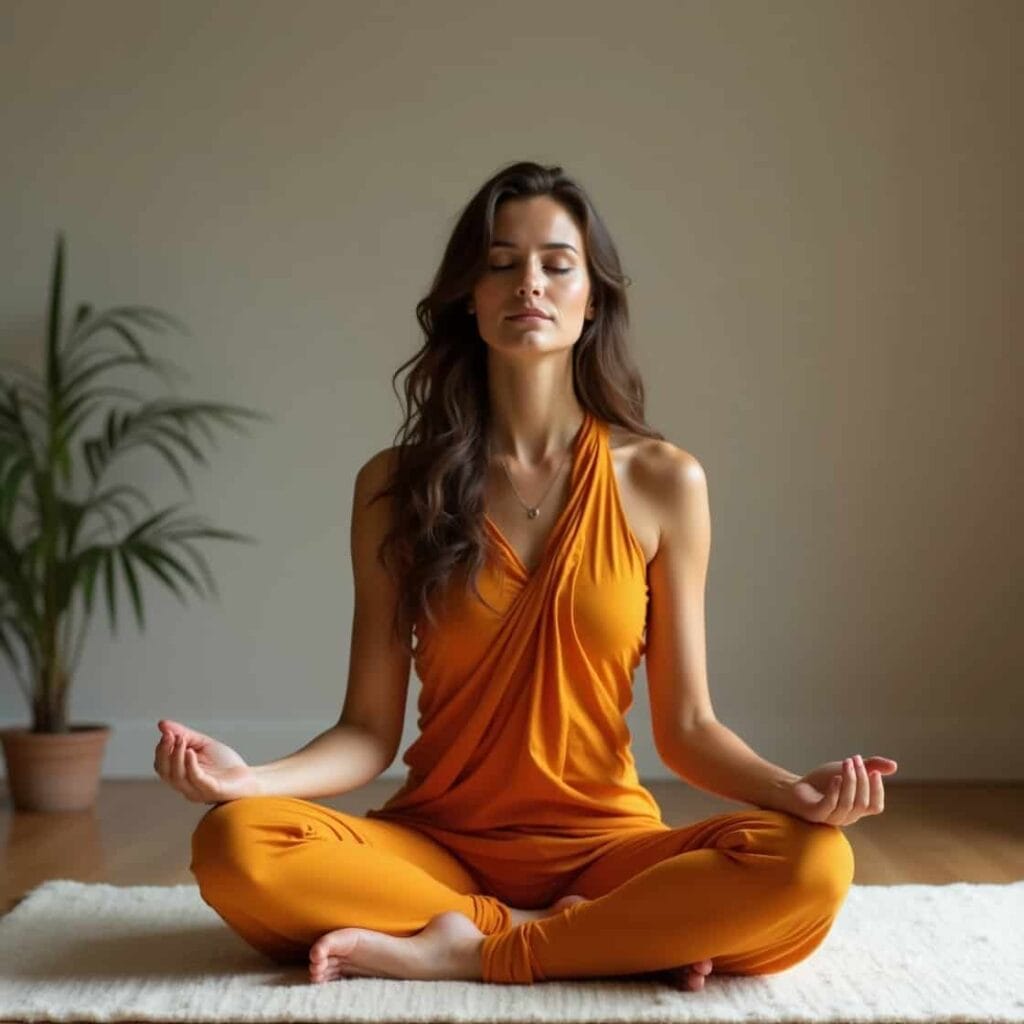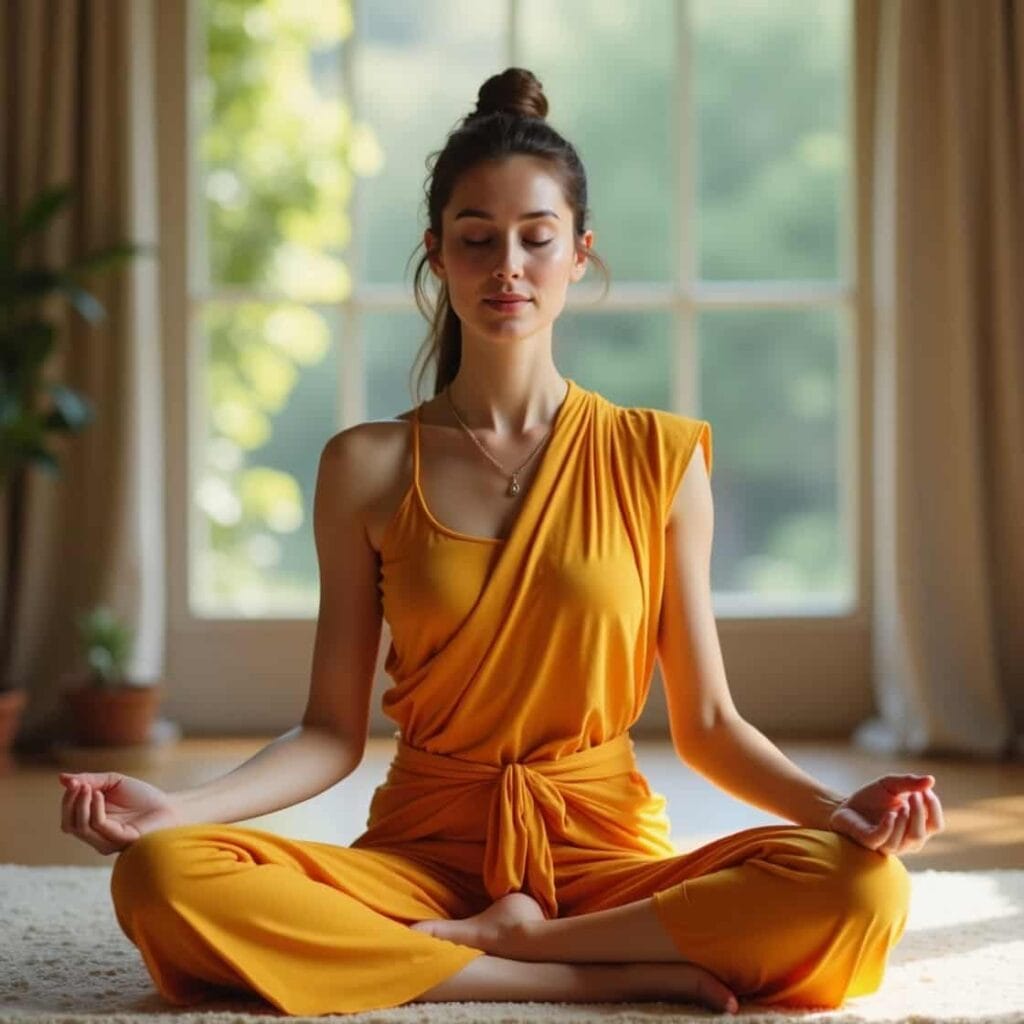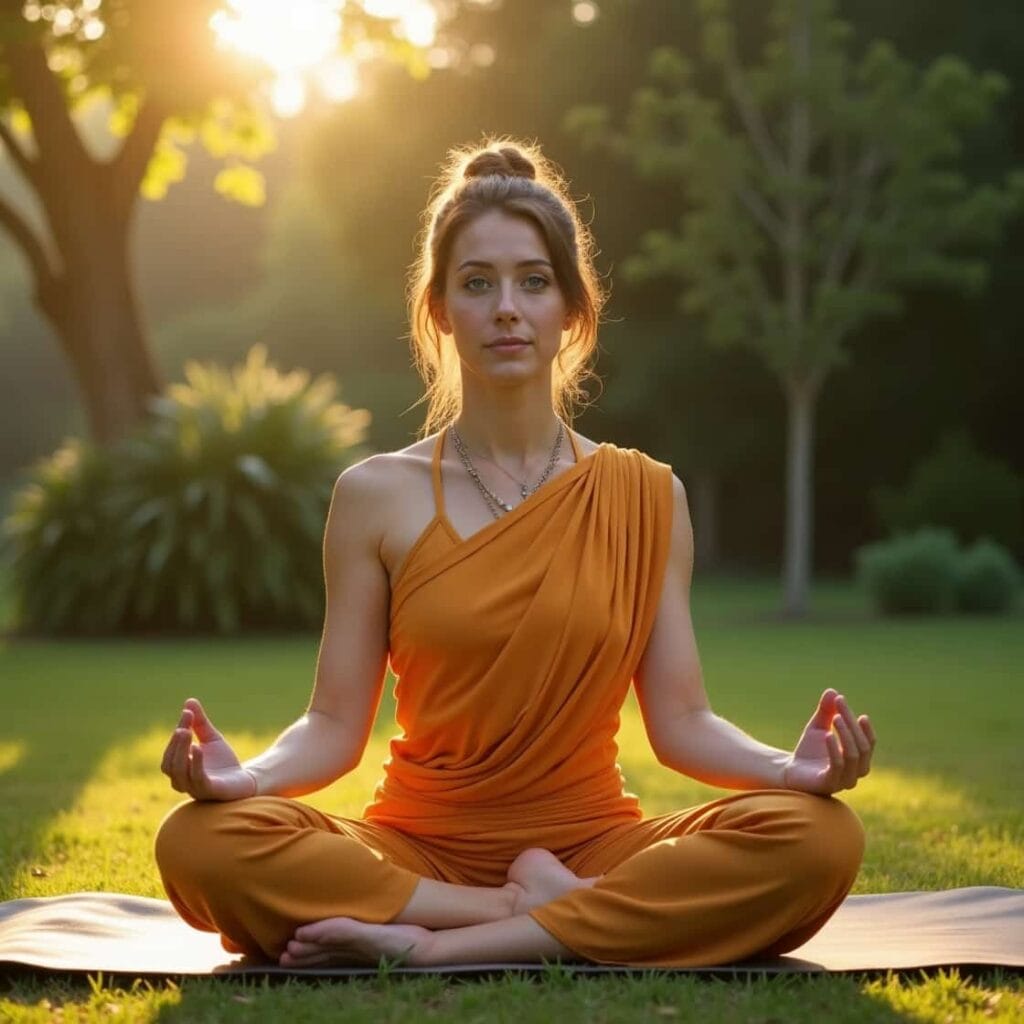
Tired of meditation techniques that feel like rocket science? Let’s talk about how to do Vipassana meditation—the straightforward method for achieving peace. No apps, no expensive cushions—just you and your breath (and that one quiet spot behind the laundry pile). Here’s the twist: this 2,500-year-old practice is about noticing thoughts without getting tangled in them—like watching soap bubbles float by.
Unlike Himalayan cave retreats, you won’t need a passport or a vow of silence. All you need? 5 minutes and the ability to ignore your growling stomach (because, let’s be real, meditation hunger hits harder than Monday mornings).
Vipassana Meditation: What Is It?
Let’s cut the fluff: Vipassana means “seeing life without the Instagram filter.” No mantras, no magic—just you, your breath, and the art of not freaking out when your knee itches or your brain replays that cringe text from 2017.
Here’s the tea:
- What it is: A 2,500-year-old practice rediscovered by Buddha (yes, that Buddha). You sit. You notice stuff. You don’t do anything. Think of it as people-watching your own mind.
- How it works: Instead of fighting thoughts or chasing zen, you just… watch. Like a scientist studying ants, but the ants are your feelings.
- What’s the point?A mindfulness boot camp that begins at three in the morning teaches you to identify stress before it becomes a movie or a “why am I like this?” spiral.
Pro tip: You don’t need to sit like a statue. If your foot falls asleep, notice it. If your brain’s yelling “this is boring!”, notice that too. Vipassana’s superpower? Teaching you to respond, not react.
Bottom line: It’s less “empty your mind”, more “oh, that’s how I work?”. Cheaper than therapy, quieter than your group chat.
Why Perform Vipassana at Home?
Let’s be real: 10-day silent retreats sound amazing—until you remember traffic exists and your boss won’t sign off on “soul-searching” as PTO. Good news: Practicing Vipassana at home is like Netflix for your soul (minus the subscription). Here’s why:
- Convenience: No flights, no packing, no ”why is this retreat in the middle of nowhere?”. Just you, your couch, and zero judgment if you meditate in pajamas.
- Consistency: Daily practice = slow-cooked stew for your brain. Retreats are a sprint; home practice is the marathon where you actually grow.
- No cost: Free.99. No $500 cushions, no “donation-based” guilt trips. Pro tip: Save that cash for emergency pizza post-meditation.
- Personal space: Turn your corner into a sweatpants kingdom. No sharing mats with strangers who ommm louder than your inner critic.
Bottom line: Vipassana at home = all the calm, none of the chaos. Just don’t blame us if your cat judges your “serene” face.
How to Get Ready for Meditation in Vipassana
Here’s everything you need to begin Vipassana meditation, explained like I’m talking to a friend over coffee:
Find any quiet-ish spot – Your closet counts if that’s what you’ve got. The cat might still meow at you, but that’s life.
Sit however works for you – On a chair, cushion, or even your bed (but if you catch yourself dozing off, maybe sit up straighter).
Grab a timer – Start with just 5 minutes if that’s all you can manage. Nobody meditates perfectly the first time – or the fiftieth.
Bring curiosity, not expectations – Your mind will wander to dinner plans or that embarrassing childhood memory. That’s not failing – that’s the practice!
The beautiful thing? You don’t need special gear or perfect conditions. Some of my best meditations happened with my back against the laundry room door, hiding from my kids for five precious minutes.
The Complete Guide to Vipassana Meditation
1: Start by practicing breath awareness (Anapana).
First, close your eyes. Then, breathe—normal, boring breaths, not the “I’m hyperventilating into a paper bag” kind.

Here’s how:
- Focus on your nostrils (yes, really). When air flows in, notice. When it flows out, notice again.
- Don’t play breath dictator. Instead, let it roll like a lazy river. Think of it as people-watching your nostrils.
But here’s the kicker: If your brain starts drafting grocery lists or replaying that cringe moment, gently tug it back to your nostrils. No guilt, just try again. After all, this is mindfulness bootcamp—no drill sergeants, just you vs. your wandering brain. Spoiler: You’ll lose. A lot. But that’s the whole point
2. Look Over Your Body (Vipassana).

Body scanning? It’s just a lazy road trip from your head to your toes. Start at the top—yes, your overthinking noggin—and slowly drag attention downward, like a snail on vacation. Notice tingles, warmth, or that sock seam plotting mutiny… or absolutely nothing. No biggie! Stay neutral: don’t marry the cozy spots or ghost the achy ones. By the time you hit your toes, you might feel zen or realize your foot’s been asleep since Beyoncé’s last tour. Either way, you’ve nailed Vipassana meditation—noticing stuff without turning it into a TED Talk.
Pro tip: If your brain rebels, whisper, “We’re just curious.” Trust me, brains hate FOMO—even if it’s about toe gossip.
3. One method of practicing vipassana meditation is to be equanimous.

First, let thoughts crash through your mind like a toddler on a sugar high—but don’t chase them. Next, when feelings show up (hello, 3 a.m. anxiety!), just notice—no RSVP required. Meanwhile, train your brain like a distracted puppy: “Nope, we’re not obsessing over that typo. Look, a squirrel!” Over time, life’s nonsense—slow walkers, burnt toast—rolls off you like water off a duck. In short, you’re not unfeeling—you’re curating your mental junk drawer. So whisper “Noted. Moving on,” and let drama fizzle. Equanimous? Call it “adulting for your inner chaos gremlin.
4. End with Stillness is a method for practicing vipassana meditation.

End with Stillness (Yes, You Can Do It)
Finally, after body-scanning like a human metal detector, let your brain flop—no more poking! Rest your awareness for a minute, such that your brain simply revels watched a meditation series. Then, crack open your eyes slower than a Monday morning, stretch like a cat who’s judging your life choices, and boom: you’ve survived. But if your legs scream “WE’RE ALIVE?!” after sitting still, so what? You’re not a statue. Think of it as rebooting your body without the awkward “password?” screen. Pro tip: If you feel weird, blame the stillness. “Sorry, folks, my toes might stage a revolt.
Tips for Those Just Starting Out with Vipassana Meditation
🟢 Start small – Honestly, 10 minutes a day is plenty. You wouldn’t run a marathon on day one, right? Same idea.
🟢 Be patient – Here’s the thing: clarity piles up like laundry—slowly, annoyingly, but totally worth it.
🟢 Use a journal – Because your brain loves shortcuts (and forgetting stuff). Write it down. Yes, even the “weird” thoughts.
🟢 Try guided sessions – Look, beginners get lost. It’s normal. A friendly voice helps—like GPS, but for
Some Typical Mistakes to Avoid
❌ Expecting instant calm – Your mind isn’t a light switch. It’s more like a grumpy cat—won’t settle just because you said so.
❌ Forcing sensations – Don’t chase fireworks. If all you feel is boredom, cool. If you feel nothing? Also cool. Just watch.
❌ Skipping sessions – One day off turns into ten. Think of it like brushing your teeth—miss it, and things get weird.
❌ Multitasking afterward – Rushing off? Bad idea. Sit for 5 minutes. Pretend you’re a tree (roots, not leaves).
Meditation fails happen. Laugh, shrug, try again.
FAQs about practicing vipassana meditation
❓ What’s Vipassana in plain talk?
It’s like being a scientist of your own brain. You watch your breath and body buzzes without getting tangled in them. No special powers needed – just noticing stuff like you’re window-shopping your thoughts.
❓ Can my couch become my meditation cave?
You bet. Home practice is like making grilled cheese – no fancy chef required. Start with free online guides (but maybe skip the incense if your smoke alarm’s sensitive).
❓ How much time? Be real.
10 minutes is plenty to start. Trying to sit still for an hour immediately? That’s how people decide they “can’t meditate.” Slow growth sticks.
❓ Do I need a teacher breathing down my neck?
Not really. It’s like riding a bike – you can learn solo, but scraped knees happen. Free resources work if you’re okay with some trial and error.
❓ When’s the golden hour for meditating?
Morning’s great if you don’t hate daylight. Night works if you’re not already asleep sitting up. Pro tip: Meditating > doom scrolling before bed.
Remember: If you catch yourself planning dinner mid-meditation? Normal. Just gently return – like herding a distracted puppy
Final Thoughts
Vipassana isn’t some magic escape hatch—it’s about seeing your messy, beautiful life clearly, without freaking out. Practicing at home (yes, even in sweatpants) can dial down stress, toughen up your emotions, and help you remember who you were before life turned you into a to-do list. 🌱 Start now—just one breath. Then another. No need for perfect silence or a zen garden—your couch works fine. Inner peace isn’t miles away; it’s hiding in the next three minutes you bother to notice. (And if your mind wanders to lunch plans? Classic. Just nudge it back—like herding a snack-obsessed goat.)
Recommended Reads:
- 👉 Morning Yoga Stretches to Start Your Day
- 👉 Kriya Yoga at Home: Complete Guide for Daily Practice
- 👉 Guided Meditation for Deep Sleep
👉 Follow us on Pinterest: @AdiCreatorOfficial




